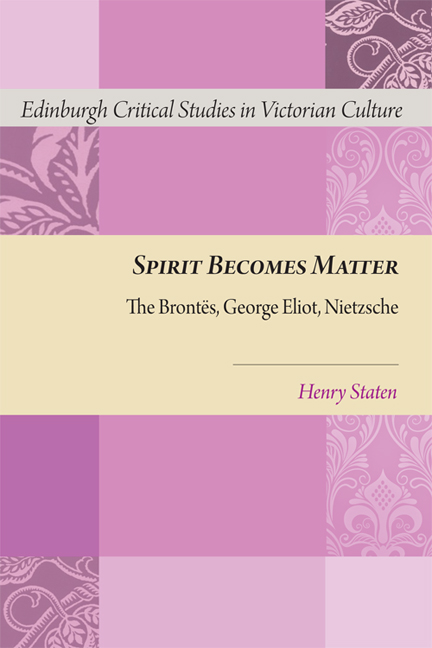Book contents
- Frontmatter
- Contents
- Series Editor's Preface
- Author's Preface
- Acknowledgements
- Dedication
- Introduction
- 1 The Poisoned Gift of Forgiveness (Jane Eyre)
- 2 Subincision of the Ethical Subject (Middlemarch)
- 3 What Things Cost in Middlemarch
- 4 The Return to the Heath (Wuthering Heights)
- 5 Spirit Becomes Matter
- Index
5 - Spirit Becomes Matter
Published online by Cambridge University Press: 05 August 2016
- Frontmatter
- Contents
- Series Editor's Preface
- Author's Preface
- Acknowledgements
- Dedication
- Introduction
- 1 The Poisoned Gift of Forgiveness (Jane Eyre)
- 2 Subincision of the Ethical Subject (Middlemarch)
- 3 What Things Cost in Middlemarch
- 4 The Return to the Heath (Wuthering Heights)
- 5 Spirit Becomes Matter
- Index
Summary
In The Professor, Jane Eyre and Middlemarch the moral neutrality or objectivity of the modernist gaze at life is beginning to develop. In these books we breathe a moral atmosphere a world away from that of, say, Vanity Fair, and even quite different from that of such a much less obtrusively moralistic writer (in most of her novels) as Jane Austen. This new moral atmosphere is what Heather Glen notices about Jane Eyre when she remarks that
The power that Jane [Eyre] most covets is not that of moral influence; and her trajectory is not exactly presented as a process of moral growth. When as a young woman she finds that her Reed cousins have lost their erstwhile power to oppress her, the reason she gives has little to do with the maturity she has acquired: ‘within the last few months feelings had been stirred in me so much more potent than any they could raise … that their airs gave me no concern either for good or bad’ (229). Contemplating Blanche Ingram, she feels a peculiar, hectic ‘agitation’, as she is drawn into an excited sense of how her rival's romantic campaign might more successfully be pursued.
Glen goes through the whole novel, giving further examples of the pragmatic cast of Jane's motivations, motivations that exist on a parallel plane with her moral and religious ideas, but develop according to their own internal dynamics: ‘Reunited with [Rochester] at Ferndean, she shows considerably more interest in provoking his sexual jealousy than in ensuring that he is reformed’ (97). Glen does not refer this character of the novel to the influence of physio-psychology, but what she describes is precisely the phenomenon that I have tried to explain.
In France, the scientific observation of the passions had begun to emerge much earlier than it did in England. Already in the seventeenth century works like the Maxims of La Rochefoucauld (whom Nietzsche valued) and La Princesse de Clèves of Madame de Lafayette were moving toward a trans-moral moral psychology.
- Type
- Chapter
- Information
- Spirit Becomes MatterThe Brontes, George Eliot, Nietzsche, pp. 177 - 187Publisher: Edinburgh University PressPrint publication year: 2014



